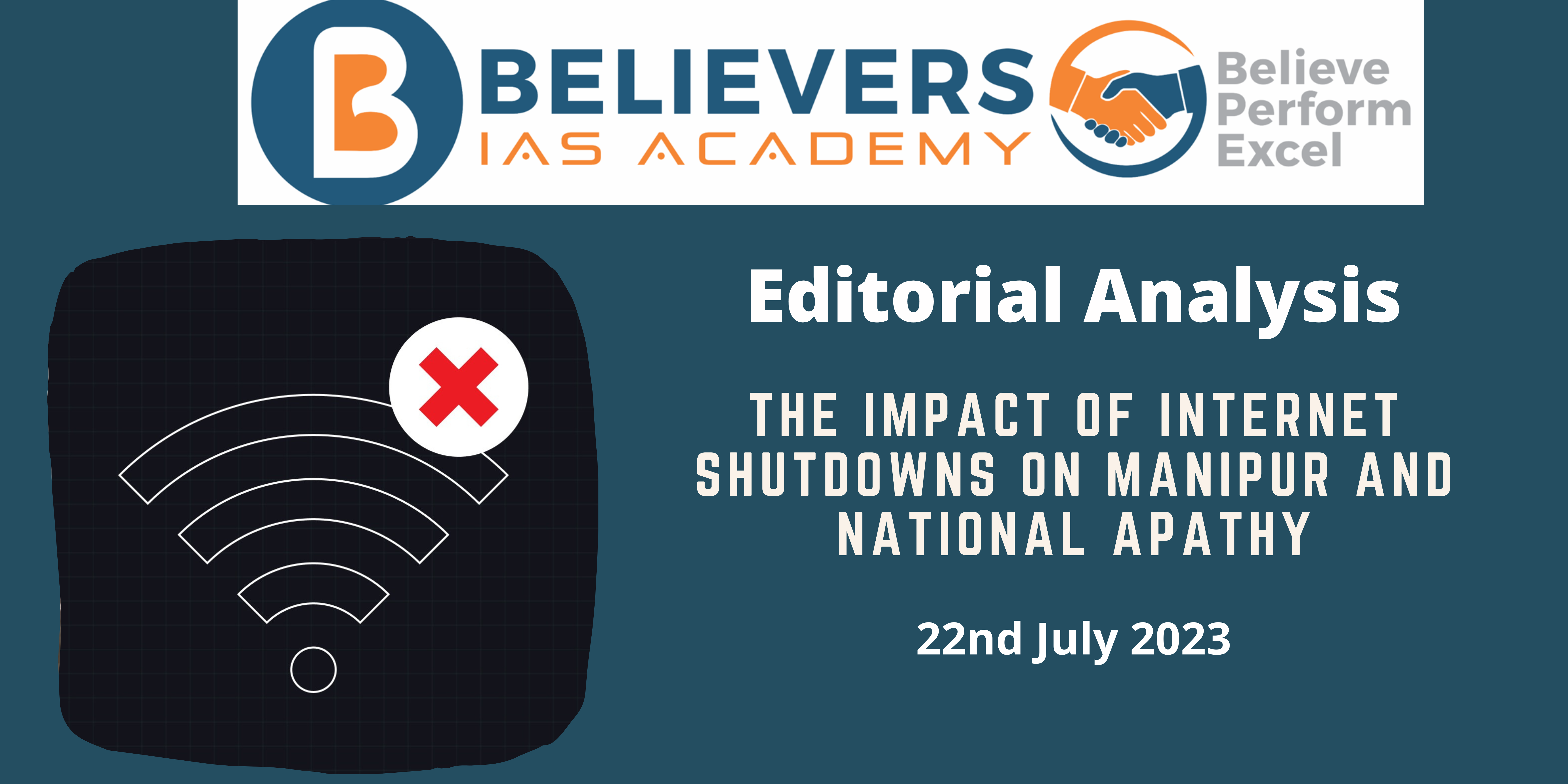The Impact of Internet Shutdowns on Manipur and National Apathy
Context:
Manipur, a state in Northeast India, has been experiencing a tumultuous period of unrest, violence, and an Internet shutdown that started on May 3, 2023.
Relevance:
GS – 02, GS – 03 (Poverty and Developmental Issues) (Communalism) (Issues Related to SCs & STs) (Issues Related to Minorities) (Government Policies & Interventions) (Pressure Groups)(North East Insurgency)
Prelims:
Meitei Tribe, Kuki Tribe, Naga Tribe, 6th schedule, Inner Line Permit (ILP), Lokur Committee 1965, Bhuria Commission, Xaxa Committee, Armed Forces (Special Powers) Act (AFSPA).
Mains Question:
- Discuss the implications of Internet shutdowns in states like Manipur and their impact on national apathy. How can the government strike a balance between security concerns and safeguarding citizens’ rights and access to information during such crises? (250 words)
Internet Shutdowns
- The alarming rise of internet shutdowns garnered global attention in 2011 with the first major incident in Egypt. From 2016-2021, the #KeepItOn coalition documented a staggering 931 shutdowns in 74 countries, with Asia and Africa experiencing the majority of these episodes.
- India stands out more than100 instances of internet blockage or disruption so far, with a significant portion at least 80% of episodes concentrated in Jammu & Kashmir
- Internet shutdowns cast a dark shadow over electoral processes, as they hinder digital tools crucial for campaigning, public discussion, voting, and overseeing elections. Beyond political implications, internet shutdowns inflict heavy economic costs across all sectors, disrupting financial transactions, commerce, and industry.
- For instance, Myanmar experienced an approximate loss of USD 2.8 billion in economic progress from February to December 2021 due to shutdowns.
- Internet shutdowns adversely impact education, hindering learning outcomes and communication between teachers, school administrators, and families. Furthermore, critical health and humanitarian assistance services suffer disruptions.
Dimensions of the Article:
- The Blanket Order and Lack of Supportive Data
- A Glimpse into the Suffering of Manipur’s People
- Judicial Response and the Supreme Court’s Avoidance
- The Vital Role of Information Flow
The Blanket Order and Lack of Supportive Data
- The Internet shutdown in Manipur has been an indiscriminate blanket prohibition, affecting all web traffic and mediums of connectivity throughout the entire state. The orders issued by the Commissioner (Home) of Manipur under the Telecom Suspension Rules vaguely state the intention to thwart anti-national and anti-social elements by curbing the spread of disinformation and false rumors on social media.
- However, there is a conspicuous absence of concrete data or instances demonstrating the effectiveness of the shutdown in preventing violence.
- Notably, these orders lack specificity, merely being repetitive with minor date changes, possibly implying an indefinite extension.
- This raises concerns about compliance and questions the adherence to the Supreme Court’s judgment on Internet shutdowns in Jammu and Kashmir (Anuradha Bhasin vs Union of India).
A Glimpse into the Suffering of Manipur’s People
- During the Internet shutdown, reports have emerged revealing the harsh reality faced by the people of Manipur. While protests erupted in Delhi, the information flow from Manipur depicted tales of financial hardships faced by students pursuing education in metropolitan cities and difficulties in evacuating residents to relief camps.
- In response to these circumstances, petitions challenging the orders were filed in the High Court of Manipur, leading to partial restoration of Internet access after several hearings.
- The primary objective of limited Internet usage for essential services raises constitutional concerns and highlights the institutional grammar surrounding Internet shutdowns.
Judicial Response and the Supreme Court’s Avoidance
- The High Court of Manipur has taken steps in alignment with judicial doctrine and practices, permitting provisional access for certain services. However, the lack of clarity in defining terms like “social media” and continued prohibition on smartphone Internet usage effectively prolongs the ban on Internet access in Manipur.
- The Supreme Court, on the other hand, has displayed a pattern of judicial avoidance. Despite opportunities to adjudicate on the Internet shutdown, the apex court has refrained from decisive action, even while examining broader issues of violence.
The Vital Role of Information Flow
- Ironically, an Internet ban often leads to an increase in misinformation rather than curbing it. Reports have shown how disinformation fueled sexual violence against women from the Kuki-Zo community in Manipur.
- Therefore, the video clip depicting the violence becomes a crucial moment for national awakening, but it must be handled sensitively to avoid harm to survivors and prevent communal hatred. Information flow also plays a crucial role in holding the State and central governments accountable for truth, justice, and reconciliation.
- To achieve this, the judiciary must build upon the precedent set by the Anuradha Bhasin case and demand accountability from the executive.
Way Forward
The situation in Manipur demands immediate attention and decisive action from the government and the judiciary. The Internet shutdown’s propriety and its impact on national apathy need to be deeply assessed and addressed through open dialogue with the affected communities. Restoring Internet access while ensuring appropriate measures to tackle disinformation can lead to better accountability and transparency in governance.




